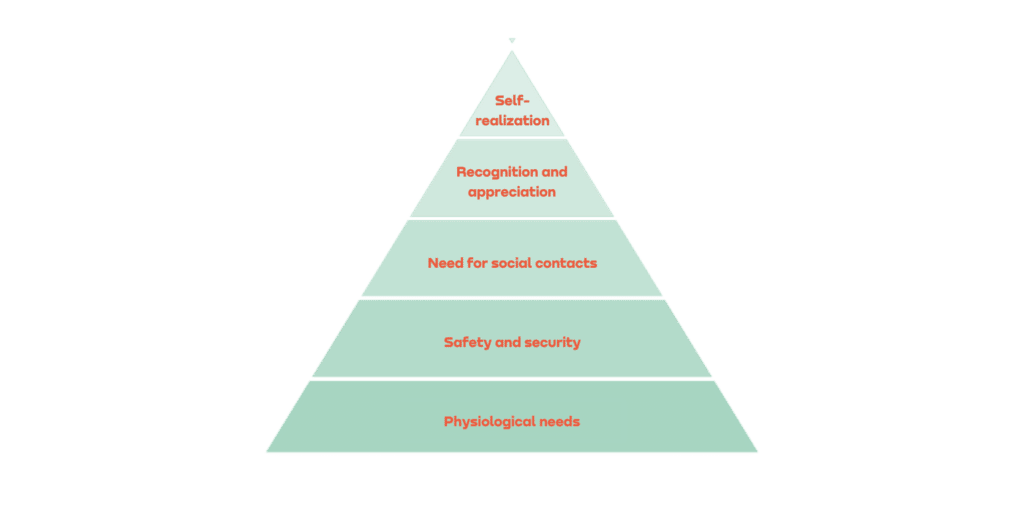At the beginning of June, Jobat published an article with the eloquent title: “Young people consciously choose a job with meaning”. Although we agree 100%, this requires some nuance. Because where does that urge for meaning in the job suddenly come from? And what exactly does meaning mean? And how do you, as an HR professional, ensure that this creates fewer unfilled vacancies?
Work to live.
Maslow’s Pyramid (see Fig. 1) ranks universal human needs in a hierarchy. His theory states that people only strive to satisfy needs higher in the pyramid after lower needs have been met. For example, people’s first concern is adequate food, drink and sleep (physiological needs). Only then, security, social contact, recognition/appreciation and self-development become important.

Today we live in prosperous times. The time when a job was only necessary to get a living (read: to be able to meet physiological needs), or when one could be ‘glad that one had job security’ is long gone. In the last decade, the workplace has increasingly been about ‘being able to connect with colleagues (social contact) or ‘being valued by the manager’ (recognition) and especially ‘being able to develop myself’ (self-realization). In other words: the expectations of employees with regard to their work follow entirely Maslow’s theory.
Maslow 2.0
But why can’t we find ‘meaning’ in this Pyramid? We take a leap back in time to the mid-20th century when Maslow’s Pyramid was introduced. After a period in which WW I, II and the Spanish Flu seriously affected things in Europe, the focus of many people was mainly on physiological needs and safety & security. In other words, the top of the pyramid was shrouded in thick fog at that time. The icing on the cake, so to speak.
In the 21st century, we have unprecedented prosperity in Western Europe. People entering the labor market today have never had to ask themselves whether there would be bread on the table the next day. Whether there would be job security the next day. On the contrary: Millennials and Generation Z have been given the message throughout their upbringing: “You should do what you love in life”. They have been given the opportunity by their parents to “develop themselves” in the way that seemed most appropriate to them.

In other words, the expectations of this generation are sky-high. That’s why a reworked Maslow pyramid has recently emerged. Where -on reaching the original top- an unstoppable urge for meaning arises. The feeling of “Is this all there is?” takes the upper hand.
Not just young people.
Contrary to what Jobat’s article claims, the search for meaning is not, as far as we are concerned, a phenomenon that only affects the younger generations. In our article ‘Shift in the labor market: 65% leave the sector’ you already read that the existential issue concerns employees of all ages.
In fact, employees with several years on the counter even more often ask themselves the question “Is this all there is?”. Call it the “professional midlife crisis”: a moment when it is time for something else, but people are not sharp about what exactly.
What does meaning mean?
Meaning is a very personal matter. This takes on a different shape and proportion in the career goals for each individual.
In part 2 of our series on meaning in the job, we give you all the insights into what that meaning is exactly and what it means for the jobs in your organization.
How do you create jobs with meaning?
Meaning as a weapon in the war for talent? We tell you how you can bind employees to you by responding to their personal approach to ‘job meaning’. Read all about it in the final part of our trilogy.